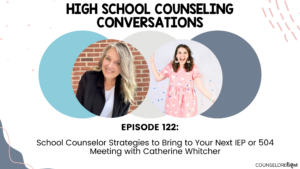
Here's What to Expect in This Episode:
We’ve officially entered the last quarter of the school year, which means graduation for seniors is just around the corner. However, we all know some students who are at risk and in jeopardy of not getting their diplomas. As high school counselors, it’s part of our job to help those at-risk students graduate. So, I’m sharing ways you can specifically support them during this time.
Being a high school counselor, you probably already have a relationship with these at-risk students and have supported them throughout their high school years. However, with graduation approaching, that relationship becomes even more important. Knowing the student, the ones close to them, what motivates them, and their current scenario and situation, along with a few other things, is necessary to help them achieve this goal.
We tend to put a weight on ourselves to make these at-risk students successful and graduate, but we can’t do everything for them. Instead, we provide them with the tools, resources, and support to walk across the stage and have a sense of direction once they graduate. So, if you have a few students in mind who are at risk of not graduating, this episode is for you!
Topics Covered in This Episode:
- Things for you specifically to do with at-risk students who you’re worried won’t graduate
- Why building a relationship with students is essential to their success and connection to school
- Our wish for students once they leave high school and the direction we want them to go
- How to make sure students are on track to graduate high school
- Ways to incorporate and communicate with parents and administrations
Resources Mentioned in This Episode:
- Free Podcast Playlist: Classroom Lessons Playlist
- Resource: High School Counseling Graduation Credit Check Spreadsheet
- Resource: Life After High School Classroom Lesson
- Resource: Goal Setting Classroom Lesson
- Blog Post: Remember These 3 Fundamentals When Engaging Failing Students
- Podcast: Episode 47, 3 Ways to Help Your Failing Students Find Success
- Podcast: Episode 63, Strategies to Employ When You Have Frequent Flyer Students
- Leave your review for School Counseling Conversations on Apple Podcasts
Other Blog Posts You Might Like:
Read the transcript for this episode:
Lauren Tingle 0:00
We have all worked with students who are off track or barely making it as we get closer to graduation. You know the ones I’m talking about the students, you feel like you are dragging to the finish line, the ones who you will hoot and holler about when they cross that stage only because you know how much of an accomplishment it is that they did what they did, they finally did it, they got that cap and gown on, they walked across the stage, and they have that deployment in hand.
Lauren Tingle 0:28
On one hand, it’s one of the gifts of the job, one of the places you feel most useful, like you made a difference. When you see those students across the stage and their stories just flashed through your brain, you know that with the trauma they’ve been through, you know, with what they’ve had to endure, with all the junk that’s been thrown their way or the dumb decisions they’ve made along the way, you’re just plain proud that they’re here and they’re doing it.
Lauren Tingle 0:53
And then on the other hand, these same students have given you a run for your money for sure. They’ve been causing you sleepless nights, you’ve had to go to bat for them over and over again, when an administrator forgets that they’re dealing with real humans here and not just graduation rate numbers. You’ve done everything short of doing the economics budgeting project for them. Yes, I’m speaking from experience, they needed that to graduate. And I felt like I was basically doing the project. No, I’m not doing that for them.
Lauren Tingle 1:22
Those students who are really on top of things, you know, the ones who are really academically driven, they took up a lot of your time back in the fall. But the seniors that we’re talking about today, they’re the ones who are taking up much of your springtime, and your coveted and very valuable mental real estate.
Lauren Tingle 1:39
And let me tell you, there’s not much left in my brain right now. So I do know how you’re feeling. Let’s use this episode to talk about how we see these students these off track students all the way through to graduation.
Lauren Tingle 2:24
You know these students all too well. Personal opinion, I love these students, even if they’ve sent my blood pressure through the roof and to the moon. Perhaps this is a student who has been credit deficient on and off throughout their time in high school. So we’ve gotten to know them pretty well over time, just keeping tabs on them and their academics. Maybe they’ve had other risk factors for not graduating like their attendance is hit or miss or they’ve been back and forth from alternative school and some behavioral incidents.
Lauren Tingle 2:56
Chances are you know these students by name and they know you too. Depending on how your caseloads are set up, you may be the one consistent adult that sees the student and knows them throughout their time in high school. Or maybe your caseload setup isn’t where you stay with the same students, but you’ve somehow got a magnet attached to you and them and you’re just invested with them until the end, okay, it happens.
Lauren Tingle 3:19
Whether you’d refer to this student as an off grade level student, or credit deficient student or an at risk student, there’s one thing we can all agree on. We have a bit of a weight on our shoulders from the higher ups and just a weight that we put on ourselves to see our students be successful. We’re trying to bear up under this weight of graduation.
Lauren Tingle 3:39
We know that our high school students will find a sense of accomplishment and direction once they have that diploma in hand, we just have to motivate them and communicate that with them. We know that more doors will be opened for them once they’ve completed this seemingly monumental task of graduation so that they can move on with life.
Lauren Tingle 3:57
Yes, of course, we desire our students to have plans after graduation. I want them to know what they’re doing when they leave the school building walls. We want them to have a job lined up or an apprenticeship going for them or college or be signed on with the military, something that gives them direction. But at the bare minimum, we just want them to have that diploma in their hand.
Lauren Tingle 4:20
So let’s touch base about some of the things that we need to be doing specifically with these students who we’re worried won’t get to this graduation place. This hopefully small select group of students are taking up a lot of our energy. But we do want to be sure that we’ve got our ducks in a row for accountability sake and to say that we’ve done everything we can to help them.
Lauren Tingle 4:39
We can’t deny the pressure that we’re feeling built up over the students. So we need to have a reality check with ourselves to that. We’re not magicians we’re not fairy godmothers. We are problem solvers. But we can’t snap our fingers and solve the depths of all of our students problems or just blink twice and make our graduation rates reach 100% though that would be nice. And I’m sure our principals would want us to be able to do that.
Lauren Tingle 5:03
So first, I want you to solidify your relationship with this student, they have to know you’re on their team and that you’re fighting for them. At this point, many others in the school may have given up on them if they’re getting close to graduation, and the end seems really far off.
Lauren Tingle 5:18
Some of their adults and even friends may have written them off at this point, things like ordering their cap and gown and doing senior-y celebration, things may feel really far off to them, because they’re not even sure they’re going to make it like you should probably check and see if they’ve ordered that cap and gown, because they might have just written it off and determined that they don’t need it because they’re not walking because they’re not going to graduate.
Lauren Tingle 5:40
So I want you to have many sit down conversations with these students and let them know that you’re on their side, and that you want to see them walk across that stage. Even if it feels like these conversations are falling on deaf ears, I want you to do it.
Lauren Tingle 5:56
Next, but still in the relationship category, you have to be in contact with this student’s parents, teachers and friends. This feels like a lot. I know you’re rallying like their whole group of all the people who know them and care about them. And you may get mixed responses from people like the parents, but you have to do what you can to have the conversations even if they’re hard.
Lauren Tingle 6:18
Let them know what the student needs to do or accomplish in order to graduate at this point. Now, they may feel at their wit’s end, like there’s nothing I can do or I’ve tried, but he won’t listen to me. Or you may even hear them come across really jaded, like saying something like I believe it when I see it, or she’s always been like this. Interject some hope into these conversations by letting them know it’s still possible to get there, we’ve just got to work together to make it happen. Give the parents a plan.
Lauren Tingle 6:46
Next consult with teachers. The students have already been on their teacher’s radars, I’m sure and the teachers who teach seniors know, they know that they want a student to pass, they don’t want to see a student fail their class, especially these ones who are teaching seniors year after year. They know that students need their class for graduation.
Lauren Tingle 7:05
But that still means that the student has to put in the work. So make sure that you as the counselor are on the same page as the teacher and the student. I found that these teachers are exhausted too by the end of the year, they’ve been having these conversations over and over again.
Lauren Tingle 7:19
They’re exhausted by students excuses. And the second, third, fourth and 100 chances that they have already given them. But reassure those teachers, we are almost there, and we’re doing it together.
Lauren Tingle 7:31
And then lastly, in terms of relationships, I want you to know the key friends who are in on this, who is in the student circle that can help them graduate and really rally a peer group around them? Is the student motivated to play in the last soccer game of the season. And that means turning in work to be passing so that they can go do that.
Lauren Tingle 7:51
This happened to me before. So this is a real example. I had a student who was working on a computer in the hallway outside my office to finish his credit recovery class on the computer in time to run out and get on the bus for the last away game. He was so motivated to play in that soccer game, and I never could have predicted that he would have finished the class for graduation, just to go get on that bus for this game.
Lauren Tingle 8:14
If you need to have the students phone number to call them and get their butt into school in the mornings do it. Sometimes that requires some recon like asking a friend to give you that student’s cell phone number. I know it feels wild that we’re doing all of this as counselors, it never felt like this was going to be in your job description. But we’re doing whatever it takes, right?
Lauren Tingle 8:34
We’re bought in at this point, we want to see our students graduate. So what’s a phone call in the mornings to make sure they’re on their way to school in the grand scheme of things. Just one more touch point.
Lauren Tingle 8:46
Okay, with all of those things, I want you to document everything. As we’re nearing graduation, people are going to be coming to you asking what you did to help the student get to graduation.
Lauren Tingle 9:33
Now, if they do graduate, maybe they won’t be asking you these questions. It’s when you have to defend what you did or what you didn’t do that they’ll come knocking. So just do little quick documentation of when you call and talk to parents and who you talk to you. Make a note of when they came in in person or if they refuse to come in and in person and when you had those intervention meetings and kind of what you decided and what you talked about at those meetings.
Lauren Tingle 9:56
Keep your email records when you’re emailing teachers about what the student needs to do to graduate because you might get different information from the student than you would from the teacher. The student needs to be held accountable for these things. I always told students listen, I have done this before, I already have my high school diploma. I’m doing everything short of doing the work for you here. And I’m definitely not going to do the work. Like I told you have already done that.
Lauren Tingle 10:21
Your students will have to have some skin in the game. And I’m sure you’re having these conversations daily too as high school counselor with the students in your world like these conversations are not new to you, I just want to remind you to be documenting them.
Lauren Tingle 10:34
Check and recheck all of the scenarios for these off grade level students to get to graduation. If they are deficient with their credits, I’m sure that you are doing this already. This is one of the things that only you as the counselor are going to be responsible for. Yes, I would like to think that the student will be responsible for this too. But hey, here’s the thing.
Lauren Tingle 10:53
These students are the same students who would probably sit in a class for the entire semester with the same teacher they’ve had before. And not even notice, like I’m not being mean, I’m just saying this stuff happens. And these are probably the students that that’s going to happen to. So check, check again, recheck that they are in the classes that they need, that they’re getting the credits that they need to graduate.
Lauren Tingle 11:15
Run all of the scenarios; let them know what’s on the line, and what they have to get in their classes to make this all happen the way it’s supposed to. I’m going to link in the show notes, a high school counseling credit check spreadsheet. This is in my TPT store. And it’s also a bonus when you join as an annual member in the Clique Collaborative membership.
Lauren Tingle 11:33
Basically, it’s a digital credit check accountability spreadsheet that highlights in green and red the credits that the student has and doesn’t have respectively. You find what works best for you as a counselor, but I’ve always found that I want to have a lot of different options in looking at these credit checks.
Lauren Tingle 11:50
So I want to have a paper and pencil version, I’m going to keep them in a binder, I’m going to have at least one or two different ways that I look at this digitally and make sure that I know all the scenarios, and I know that we’re all good to get to graduation. The last thing I want is my mistake to jeopardize a student’s graduation.
Lauren Tingle 12:08
But also remind your students, they do have ownership in this too. So go through these credit checks with them. They need to understand the weight of their responsibilities from now through graduation.
Lauren Tingle 12:19
The last thing I want you to be sure you’re doing as you’re trying to see your at risk students through to graduation day is loop your administrators in. This will involve some more communication if your admin are divided up by alpha. Like it’ll feel like you’re having the same conversation over and over again, or just more of these conversations, because you’ll be doing them with more people.
Lauren Tingle 12:41
But if you work with just one senior administrator just make lots of time to go through the game plan for the students. We always said no surprises, that was our mantra, no surprises. We don’t want to get to the end and be surprised that a student didn’t make it. If we’re thinking they might not make it. We know their name. We know why and we know what the game plan is.
Lauren Tingle 13:02
So what’s the plan right now though, in the spring for all of your students? You’ve got to have a plan. So keep looping your admin into the emails that you send, bring them into the conferences that you host, bring them into conversations with parents that feel a bit more difficult, and allow them to speak in when teachers aren’t being responsive.
Lauren Tingle 13:23
Your admin should be going to bat for you as you’re exerting an absorbent amount of energy for these students. If you have a senior admin on your side, lifting you up, I know that you’re gonna be forever grateful and you’re going to feel supported. That makes a huge difference in your stress levels during this time.
Lauren Tingle 13:39
Even just having someone like the senior administrator to commiserate with, they’re probably feeling that stress too. So be sure to communicate with them what you need as you’re pursuing these students to find success by means of high school graduation.
Lauren Tingle 13:53
Take heart high school counselors were at the point in the year where these students who are at risk are really weighing on you. You’re making sure their credit deficient paths are not determining their future, you’re rallying the troops to pull them across the finish line. You are pulling out your greatest cheerleader moves and your most inspirational speeches.
Lauren Tingle 14:12
I’m no stranger to those either. You won’t win every one of these battles. But at least you can make sure you’re trying and you can hopefully feel like you’re not alone. And you’re in the trenches with this very common problem at this point in the school year. You’ve got this I’m rooting for your senior students and for you because you’re the one who’s going to help them get there. I’ll see you next week where we talk a bit more about this topic more specifically what to do if your senior won’t graduate. Bye for now.
Connect with Lauren:
Cheers + Happy Listening!
Like what you’re hearing? Follow and leave a review on Apple Podcasts. It helps other high school counseling friends find it!
Can’t contain your excitement? Share the pod! Tell a friend! Your word-of-mouth referrals mean the world to me!






